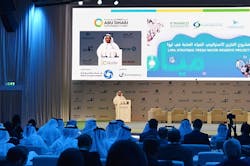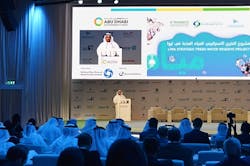World’s largest man-made desalinated water reserve completed in Abu Dhabi
ABU DHABI, UAE - Abu Dhabi has now completed what is being called the world’s largest reserve of high quality desalinated water, secured in a network of 315 recovery wells lying up to 80 meters below the Liwa Desert.
The wells are fed by one of United Arab Emirates’ (UAE) longest water pipeline networks which runs the water from Shuweihat desalination plant at a rate of 32,000 m3/day over 27 months.
Called the Liwa Strategic Water Reserve, the project was first investigated in 2002 by the Environment Agency - Abu Dhabi (EAD).
The project was then undertaken as a collaborative venture between EAD, the Abu Dhabi Water and Electricity Authority (ADWEA) and its TRANSCO subsidiary, which managed the construction and on-the-ground implementation. Other companies involved in the project include GIZ International, Do. Rainer Consultancy and ACC-POSCO JV.
Established in one of the world’s driest areas where rainfall rarely exceeds 10 cms/year, the project has been completed at an estimated cost equivalent of USD$435 million to deliver a fallback pumping capacity of 100 million gallons of water/day to the emirate if required.
The desalinated water percolates into the subsurface through basins with a system of semi-perforated underground pipes to recharge the aquifer using only gravity as a driving force.
Whenever needed, water from the 315 wells, lying up to 80 metres below ground, can be used to recover supplies at any time. The reserve now holds more than 26 million m3 of water (equivalent to 5.6 billion imperial gallons) that can bolster drinking water supply when needed.
The 160-kilometre pipeline from the strategic water reserve site to the Madinat Zayed distribution network in Abu Dhabi city consists of approximately 9,000 sections of welded pipes some of which measure 1.2 metres in diameter, and are up to 18 metres long.
The sections had to be transported into the desert and pieced together through high precision welding which would take up to five continuous hours per section with stringent, follow-on X-ray inspection to ensure the system was leak-proof and could withstand the prevailing water pressure for a minimum of 50 years.
Concerns about aquifer contamination from large animals, such as roaming camels, were addressed by working with nature which resulted in the creation of a ‘groundwater protection buffer zone’ made from locally produced palm-frond while solar panels power wellhead monitoring instrumentation.
Reallocating the surplus from desalinated water into the reserve, addresses some of the challenges brought by dependence on desalination plants.
“Desalination plants can be shut down by storms, a malfunction, a random sea raft and even the red tide phenomenon which has been exacerbated by climate change and negatively impacts water quality, the environment and ultimately the local economy,” said His Excellency Dr. Saif Saleh Al Seairi, acting director general of Abu Dhabi Water and Electricity Authority (ADWEA).
“We need strategic reserves in the event of one or more stations being out of service and we need to ensure the availability of an alternative so that the population, industrial and commercial sectors are not negatively affected. The government realised the need for an alternative supply to cover our needs in the near or far term, and one which would also mitigate against climate risks and it is wisely investing in finding solutions.”
Water quality is ensured through strict control, heat and salinity monitoring equipment and a range of other metrics.
“Running the expansive well network simultaneously is a complex process.Communication and inter-team information exchange is critical. All this data is connected to a master network that acts as the project’s ‘brain’ and is housed in a state-of-the-art electronic process centre from which technicians control pumps, wells and valves and water quality which complies with RSB drinking water standards, is ensured by automatically operating at least 20 wells per day”, stated Al Seairi.
###
Read more
Desert mirage or man-man reality?
PAEW to evaluate aquifer storage & recovery with new tender in Oman

